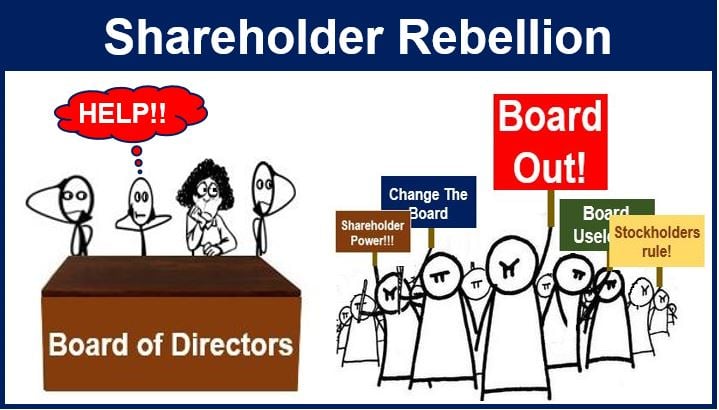A Shareholder Rebellion occurs when a company’s stockholders go against the Board of Directors of a company and either try to oppose their decisions or throw out its members.
The shareholders may rebel at a corporate annual meeting or through a proxy battle (when several shareholders are persuaded to join forces and build up enough shareholder proxies to win a corporate vote).
A shareholder rebellion may also involve stockholders threatening to crash the corporation’s share price through concentrated selling.
Michael Eisner, who was CEO of The Walt Disney Company from 1984 to 2005, was stripped of the Chairmanship in 2004 after Roy Disney, Walt Disney’s nephew, led a shareholder rebellion claiming Mr. Eisner was causing a creative brain drain by micromanaging the company’s employees.
In 2008, fifteen descendants of John D. Rockefeller joined a shareholder rebellion, forcing oil giant Exxon to change its policies on climate change.

Bank shareholders have become more rebellious
Since the turn of the century, several banks in Europe and North America have faced shareholder rebellions regarding executive bonuses. Many stockholders, as well as much of the general public, wonder whether banking executives are going back to their old behaviors, which they believe contributed to the 2008 global financial crisis.
Standard Chartered PLC, a British multinational banking and financial services company, faced a shareholder rebellion over executive pay in its May 2014 annual meeting. Its 3-year pay policy was opposed by 41% of shareholders, bringing it close to scraping its plans. Stockholders were annoyed that the bank wanted to boost bonus pay while at the same time issuing a profit warning.
In May 2014, twenty-one percent of HSBC shareholders opposed a proposed pay policy. Even though opposition was sizeable, it was not enough to block the banking giant’s proposal, which included bonuses of up to 200% of salaries.
Shareholders across the UK have no time for banks that continue paying large bonuses to underperforming executives.
According to Cambridge Dictionaries Online, a shareholder rebellion is:
“A situation in which a group of a company’s shareholders vote against particular decisions made by its directors.”
Shareholder rebellions in the oil industry
In 2021, oil giants Chevron and ExxonMobil suffered major shareholder rebellions from climate activists and dissatisfied institutional investors because they failed to establish a low-carbon strategy.
-
ExxonMobil
Dissident hedge fund activists at Engine No.1 managed to replace two Exxon board members with its own people to help push the company toward a more ecologically-friendly strategy.
-
Chevron
Dutch campaign group Follow This managed to get 61% of Chevron shareholders to agree to its proposal to force the company to cut its carbon emissions.
-
Shell
Another shareholder rebellion in the Netherlands in the same year forced oil giant Shell to reduce its carbon emissions in the next ten years by 45%.
Reasons for shareholder rebellions
Many types of issues can trigger a rebellion. Often, one can see the frustration building up and it is not a surprise when it happens. However, this is not always the case.
Here are some reasons for shareholder rebellions:
- Poor Financial Performance: Dissatisfaction with company earnings or growth.
- Corporate Governance Issues: Concerns over transparency, accountability, or ethics.
- Executive Compensation: Disagreement over high or unjustified executive pay.
- Mergers and Acquisitions: Disputes over the strategy or terms of mergers and acquisitions.
- Environmental, Social, and Governance (ESG) Concerns: Issues with sustainability, social responsibility, or governance practices.
- Succession Planning: Conflicts over leadership succession in companies.
- Strategic Direction: Disagreement with the company’s long-term strategy and decisions.
- Risk Management: Concerns over insufficient strategies for managing risks.
- Board Composition and Diversity: Demands for board diversity and appropriate expertise.
- Shareholder Rights: Issues related to voting rights or dividend policies.
- Corporate Culture and Ethics: Problems with corporate culture or unethical behavior.
- Performance Relative to Competitors: Company lagging behind industry peers.
Video – What is Shareholder Rebellion
This video presentation, from our YouTube partner channel – Marketing Business Network, explains what ‘Shareholder Rebellion’ means using simple and easy-to-understand language and examples.
